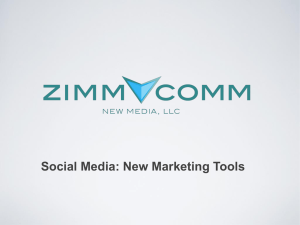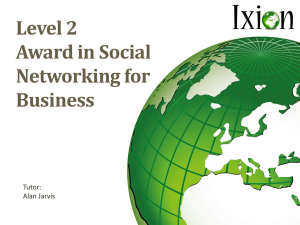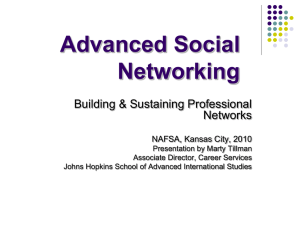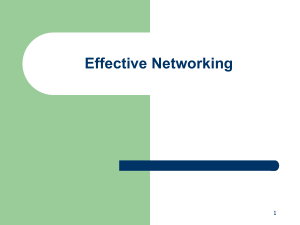Final-networking-for
advertisement
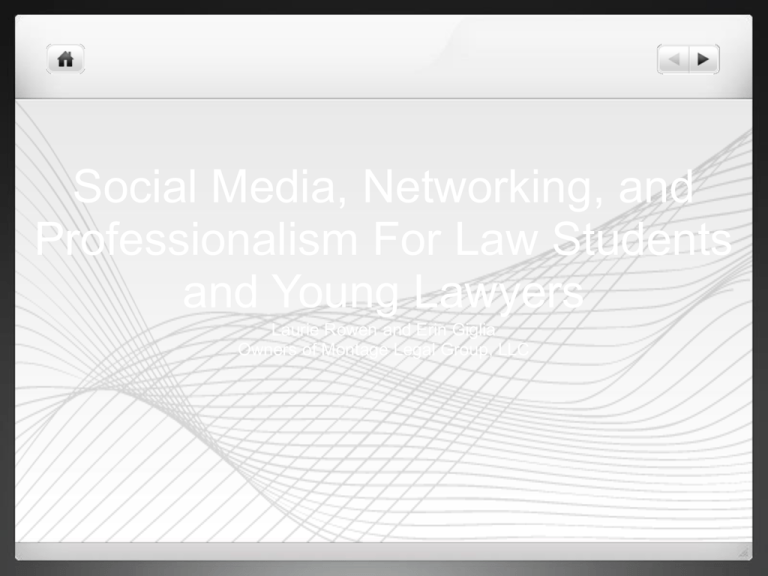
Social Media, Networking, and Professionalism For Law Students and Young Lawyers Laurie Rowen and Erin Giglia Owners of Montage Legal Group, LLC What is Networking? • Definition: “a supportive system of sharing information and services among individuals and groups having a common interest” • Networking for lawyers • Focus on helping others, not helping yourself Goals of Networking • • • • • • • Get a job or switch jobs Business development (to obtain clients) Community involvement Resume building Increase your presence in the legal community Help others – MUTUAL GOALS Meet new people and have fun! Why is Networking Important? • Relationships lead to opportunities • Being smart, or a good lawyer will only get you halfway to success • People (not just potential clients) have to know you, or know of you, in order to give you work • Be a good investment to your law firm – it leads to career growth • Referrals Excuses, Excuses, Excuses • • • • • “I’m too busy.” Business development is too overwhelming and impossible I’m too shy I hate feeling like a used car salesman I don’t want to bother people Types of Networking • Social Media and On-line Networking • Networking at Events/Deliberate Networking • Natural Networking Social Media Options • • • • • • LinkedIn Twitter Facebook Google+ Blogging New options will continue to arise Social Media – Start Networking Online • Remain professional – professional photo, self edit status updates • Limit content - Don’t put anything up you don’t want a prospective employer or contact to see. • Start a spreadsheet of all of your contacts, professional and personal (or use Linked-in) • Spend an appropriate amount of time reaching out to the right connections, but limit yourself Using Social Media Properly • When job searching, make your profiles “private” and include a professional photo Linked In – Your Searchable Online Resume • Have a complete, accurate, and up-to-date profile. • Your profile is searchable, so be sure to include areas of expertise, articles published, presentations, honors/awards. • Join relevant groups, and interest groups (clients come from all places – friends, neighbors, etc.). • Post updates, share your contacts’ accomplishments – they may return the favor. • Use “notes” section to keep track of your contacts Linked-In What is Twitter? • Facebook is for friends and family, Linked-in is for business contacts, and Twitter is for people you don’t know • Similar to Facebook status updates, but more articles are shared • Terms: Following, tweeting, @ symbol and # symbol • If you have limited time, focus on Linked-in v. twitter Social Media - Ethical Issues for Lawyers • • • • • • Read and Understand Bar Rules Improper contact with parties and possibly judges False/Misleading information Advertising/Solicitation (You Tube) Client confidentiality – “Today SUCKS - in Court for my LOSER case.” Unauthorized practice of law – providing legal advice Intentional Networking – Live Events • • • • • • Go with a friend, but make sure you branch out Approach new people Ask questions about what people do. Don’t just talk about yourself. Do NOT sell! Ask for introductions. Offer to help contact Exit strategies Choose the Right Live Events • Which organizations to choose? Choose WISELY: 1 legal (OCBA section), 1 non-legal (your area of legal expertise or hobby), Alumni, and 1 community organization. • Be interested in your groups. • Obtain leadership roles in these groups. • Why be active in a legal organization like the OCBA? Be Prepared • • • • • • Have a stack of business cards Have your elevator speech ready Attire – professional, business attire Arrive early, so you’ll have plenty of time to network before the presentation Relax, scope out the room Have a plan and stick to it Elevator Speech • • • • • • What is an elevator speech? Don’t make it too long - 15 seconds Make it conversational v. formal Have different versions Practice your speech Applies to natural networking Follow Up • • • • • Send an email Connect on Linked In Follow through with offers to help and/or remind of request for introductions Post their articles on your Linked-in page, and then tell them about it. Continue liking/commenting/sharing for contacts Natural Networking • This does not come naturally to everyone – it takes practice for some people • Talk to people everywhere. • Know what your friends and contacts do, and what their needs are. Ask questions • Make sure people know what you do (hopefully in a non-annoying way). • Most business development occurs outside the professional environment • Be approachable Cultivating Your New Contact • • • • Follow up Follow up again Follow up some more Thank for making introductions, check in to see how they’re doing, set up coffee meetings, forward articles or presentations of interest, refer work, share their stories in social media and tell them about it, send congratulations. • Consider actually becoming friends with some of these people! Recap on Networking • • • • • You are in charge of your own job search and client development Start networking now, from your computer Use social media frequently and often, but be professional Start going to networking events as a law student, but be prepared Get to know all of your Chapman Law classmates – you can help each other out later in your careers • Learn how to be a “natural networker”
